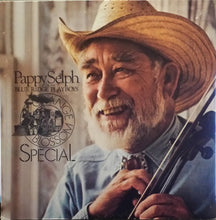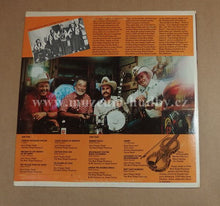Media Condition: Very Good Plus (VG+)
Sleeve Condition: Very Good Plus (VG+)
This album contains a collection of some of the finest songs by Leon "Pappy" Selph and was recorded and released in the 70's-80's? It spotlights the talents of the Blue Ridge Playboy members W.C. Averitt, Rufus Manzingo and Ron Rebstock who were current members at the time. As the records notes, they would perform the first Friday of every month at the Goode Company Barbeque (5109 Kirby Drive) in Houston, Texas.
Selph, Leon [Pappy] (1914–1999). Leon "Pappy" Selph, honky-tonk fiddler and a "founding father" of honky-tonk music, was born on April 7, 1914, in Houston to Lee and Alvenie Selph. He began playing the violin at the age of seven and studied classical violin at the Columbia Conservatory in Houston. He graduated from those studies in 1928, and he performed with the Houston Youth Symphony when he was fourteen. Selph joined W. Lee O'Daniel's Light Crust Doughboys in 1931, when he was seventeen. Although O'Daniel paid Selph $20 a week to play for the band, the fiddler's primary duty was to teach the Doughboys, who could not read music, one new song a week to perform on their radio show. Bob Wills was one of his students. At the same time, Selph was approached to instruct some of the musicians at the Grand Ole Opry, and so he commuted between Fort Worth and Nashville. When one of the featured performers fell ill, Selph also got the opportunity to perform onstage at the Opry, and he played “Orange Blossom Special” to a standing ovation.
Back in Fort Worth, members of the Light Crust Doughboys increasingly clashed with O’Daniel’s demands. When Wills moved to Waco to form the Texas Playboys, Selph joined him. Selph stayed with the Playboys until Wills moved the band to Tulsa in 1934, then moved back to Houston and formed his own band, the Blue Ridge Playboys. The group, which included legendary musicians Floyd Tillman, Moon Mullican, and Ted Daffan, signed with Columbia Records in the mid-1930s and achieved some regional success with recordings that included "Give Me My Dime Back" and the classic "Orange Blossom Special." From the 1930s until World War II the Blue Ridge Playboys had their own national radio show on KPRC in Houston. The show was canceled at the outbreak of the war.
Selph enlisted in the United States Navy and served as a firefighter. After the war he returned to Houston and joined the Houston Fire Department, where he worked for the next thirty years. He achieved the rank of captain in 1955. After he retired in 1972, he formed another band, with which he toured the Soviet Union and served as a cultural ambassador for the U.S. State Department. During his music career, he performed in some thirty states and fourteen foreign countries. His audience members included United States presidents, the King of Norway, and other dignitaries. He played at numerous venues, including clubs, hospitals, churches, and schools, around Houston and for many private and municipal functions. Selph was a mainstay for thirty-one years at the Houston Rodeo parade and was made an honorary life member of the Houston Livestock Show and Rodeo Association. The city of Houston proclaimed June 9, 1991, as “Leon Pappy Selph Appreciation Day.” In 1996 he was inducted into the Texas Western Swing Hall of Fame.
Selph had married his wife Inez about 1937; they had four children. Once he became a father, he used the nickname “Pappy” for the duration of his career. He continued to play local venues around Texas until his death on January 8, 1999, in Houston. Selph was survived by his wife, two sons, and two daughters.



